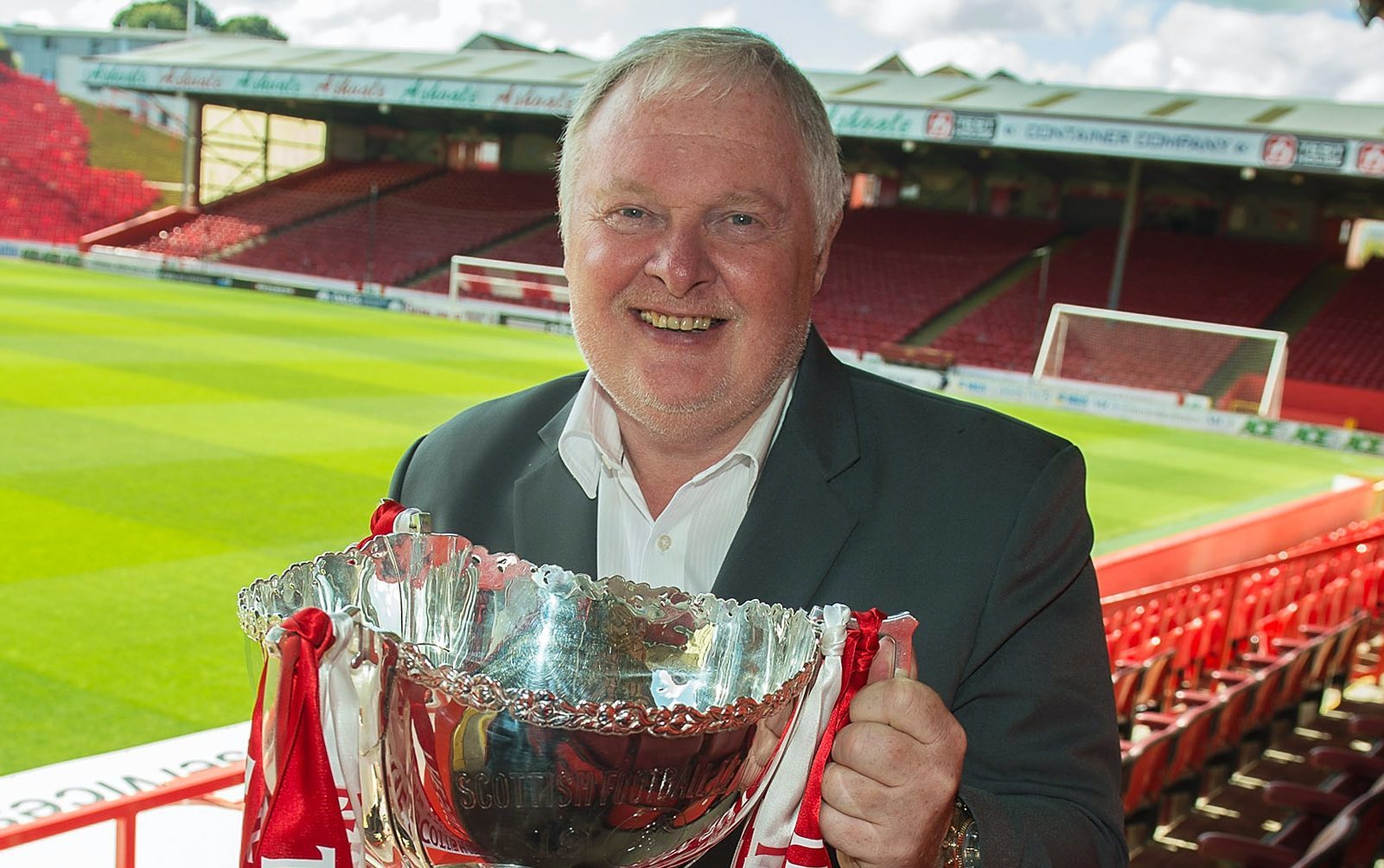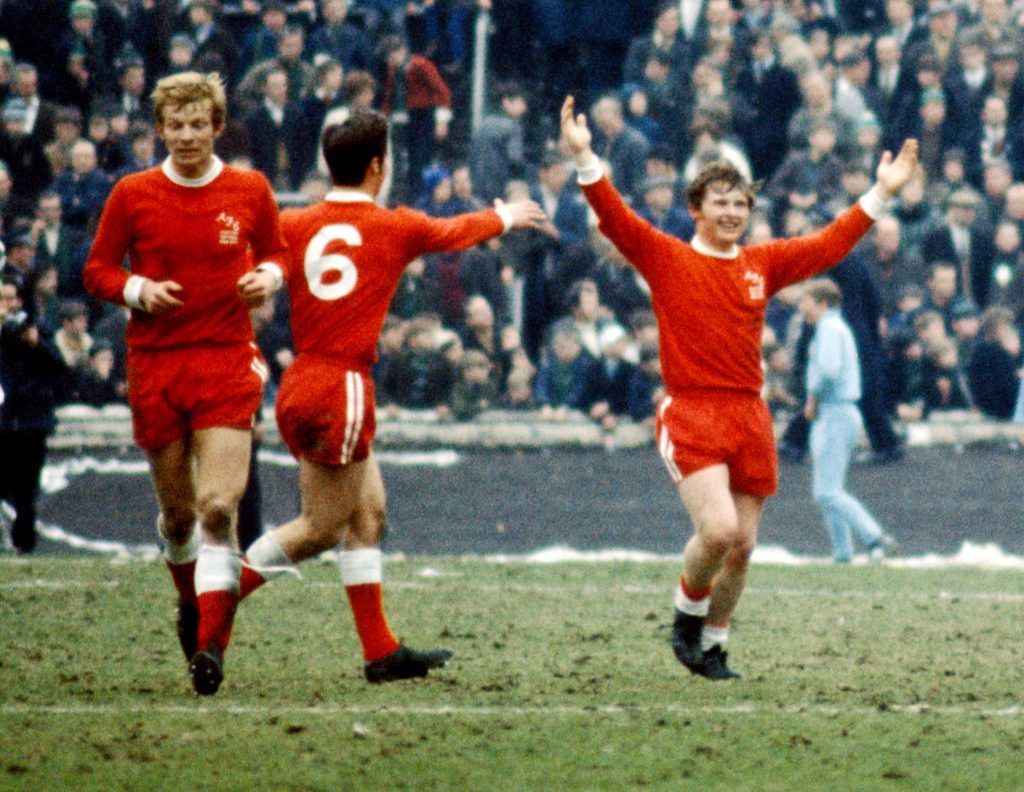
IT’S a moment as revered by the Aberdeen fans as much as Jim Baxter extracting the Michael at Wembley is by the Tartan Army.
The Scottish Cup Final, Hampden, April 11, 1970, and as Celtic players rage at referee Bobby Davidson for giving a penalty against them, Joe Harper waits the row out by casually playing keepie-up.
A nerve-shredding nine minutes passes between the award and the kick itself. But when it comes, the Dons striker is coolness itself slotting home to give his team the lead, which they never lose.
“That was the best penalty I ever struck,” said the man who, six years later, would again net against the Hoops to help the Dons capture the League Cup.
“I placed the ball just inside the post, exactly where I had intended to put it, and got plenty of power on my shot, too. Their goalkeeper had no chance.
“People made a lot about my messing about with the ball while I was waiting to take the kick.
“They seemed to think it might have been some sort of gamesmanship on my part.
“But I genuinely wasn’t nervous, not even as their protests dragged on and on.
“The truth is, I was a cocky so-and-so. Give me the ball 12 yards out with no defender near me and, as far as I was concerned, I would score every single time.
“The occasion wasn’t a factor, the opposition wasn’t a factor, the size of the crowd wasn’t a factor – penalties felt like a gift.
“That was the case right through my career. I might have been worried about some big centre-half coming right through me from behind but missing was something I was never afraid of.
“There was also another odd wee reason for the keepie-up which people might not be aware of.
“Eddie Turnbull, our manager back then, used to be paranoid about players handling the ball in games so he had a cast iron rule to make sure we never did it.
“Anyone who let the ball hit his hand had to immediately drop and do 25 press-ups on the spot – regardless of where they were.
“So when Arthur Graham threw me the ball to take the kick, although I could have easily have caught it, my instinct kicked in and I instead controlled it on my chest.
“From there, I took it on my knee and just started flicking it from foot to foot, as you do.
“What I didn’t realise was the impact it would have. I remember one journalist back then just going on and on at me that I must have been nervous.
“When I replied I really wasn’t, he asked what was going through my mind.
“I told him, well if I score this we will have a right good chance of winning and if that happens I will be the most popular man in Aberdeen tonight.
“I was right about the first part of it but Derek Mackay got two – the final score was 3-1 – so he, rather than me, was the one all the women wanted to speak to when we got back.”
A club record 205 goals neatly split across his two spells with the Dons meant playing second fiddle was a role Harper was unaccustomed to in his years in the North East.
It said it all about the popularity of “King Joey” that when he turned out in a reserve game on his return from Hibernian, the deal having gone through too late to allow him to play for the first team, 5000 fans turned out to welcome him back.
“That was a good day,” said the 68-year-old laughing at the recollection.
“I did my best to make the effort worth their while and ended up with four goals on the day.
“They all gave me pleasure, but certainly the ones in the Cup Finals were special.
“No one fancied us to win in 1970 or in the League Cup Final in 1976. But on each occasion we knew we were good enough to do it.
“Aberdeen were strong right throughout the 1970s but the ‘76 team was especially good.
“You take a look at the team sheet and you can see it straight away. It had a really solid foundation with Willie Miller, Stuart Kennedy, Bobby Clark and Willie Garner at the back.
“Dom Sullivan and Joe Smith were excellent midfielders, while up front myself, Arthur Graham, Jocky Scott and Drew Jarvie could all take on a man and chip in with goals.
“So it would have been a shame if we had come up short.
“As it was, we were just fine, with Davie Robb coming off the subs’ bench to be our matchwinner.”
And that, as the Dons icon recalls, more than made up for his experience of two years earlier when he had scored a hat-trick for Hibs in the League Cup showpiece only to end up on the wrong end of a 6-3 thrashing from Celtic.
“There was a bit more to that one than meets the eye because as an experiment they changed the offside rule in the competition that year.
“The difference was you could only be offside when you were past the 18-yard line. As the scoreline suggests, it was great for the forwards – but not so easy for the defenders.
“People thought it must have been a nightmare to score a hat-trick in a big game and still end up on the losing side but, as far as I was concerned, I had done my job.
“If you do that then sometimes things will go for you, sometimes they won’t, but you have done your best.
“That’s all we can ask from these Aberdeen players this weekend.
“If they do that they will give themselves a real chance of victory because they are a talented bunch.
“Yes, Celtic are very strong. But as we showed, in football you can never be sure what is going to happen.”
READ MORE
Aberdeen can more than match Celtic in League Cup final, insists Derek McInnes

Enjoy the convenience of having The Sunday Post delivered as a digital ePaper straight to your smartphone, tablet or computer.
Subscribe for only £5.49 a month and enjoy all the benefits of the printed paper as a digital replica.
Subscribe